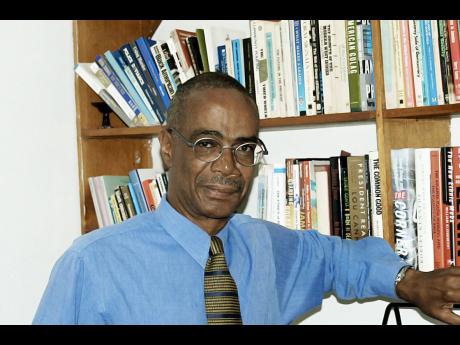W. Val Chambers | Bernard Headley – a lesson for Jamaican education
I still have in my outbox the text I sent to Dr Bernard Headley after reading his moving story in The Sunday Gleaner about how his father missed being on the Windrush. "Great story," I texted him. He had died only hours earlier.
But Headley was not always a good writer. In fact, if it were left to the English-Jamaican system of education, he may have been a bus driver like his father. We met at West Indies College in the early '60s. He was in fifth form and I was a college student. He was from St James and I from Hanover - backward rural communities both. Our language was Jamaican Patois, mine a little thicker than his.
I was luckier than he in one sense; my grandmother spoke English, and we spoke English at my church, especially to God. My grandfather read the Bible (loudly) and The Gleaner. And at church, we read and played games with the Bible, which, of course, is written in beautiful old English. I passed the Cambridge examination with a distinction. All that is my excuse for failing Headley when I read his English exam when he was a high-school boy. The boy I knew could not have passed Cambridge English or gained entrance at UWI.
When next we met, Headley was an undergraduate at Andrews University and I was studying biblical languages and Greek and Roman literature for a master's degree. I knew he went to Howard University, the leading black university in the United States, where he gained a PhD in sociology, specialising in criminology.
I was a publisher in Mandeville, where his father lived, when he came to publish The Jamaica Crime Scene. It was the cleanest manuscript I had ever received. It was well-written and hardly needed any editing. He even knew the scholarly German terms, which we biblical scholars had to learn. I was impressed.
At UWI, he was clearly top of his class. When he gave one examination, his students wrote brilliant papers. Following the British colonial tradition, there is a second marker for each exam - a leftover from the years when UWI teachers could not be trusted to mark their students' papers. When the UWI second marker read the papers written for Headley, he could not understand how students who could hardly pass his exams did so brilliantly for Headley.
The lesson? If you know your subject, teach well, and teach for success, your students will do well.
After 2003, when UCJ and the Ministry of Education shut down Liberal Arts College of Jamaica - essentially because I didn't operate with the second-marker system (we were the only college in Jamaica, apart from Mutabaruka, who could teach African history) - Headley stopped by me on Caledonia Road, Mandeville, where he was taking his mother to the doctor. He and other university teachers were embarrassed at what they were doing to me, he said.
I met Bernard Headley only a few times after that. We groaned about the academic decline in our country - we noted that the good teachers are not being replaced. The crime scene Headley studied and wrote about is getting worse. Crime, Headley shows, is the result of social forces.
Educated people and social scientists like Headley know that if you don't develop your people, some of them will turn to crime - even when a few of them are turning to God.
Bernard Headley became a professor because his father was an ambitious man and his church created a school system where you did not have to be middle-class or pass a difficult exam to go to college.
Professor Rex Nettleford once named two of the best professor at UWI. I don't remember the other one, but one of them was Bernard Headley.
- W. Val Chambers has a PhD in Hebrew Bible from Vanderbilt University. Email feedback to columns@gleanerjm.com and chambers_education@yahoo.com.

